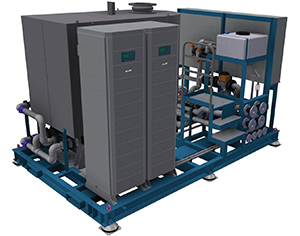U.S. ballast water management regulations require non-exempt commercial vessels operating within 12 nautical miles of the U.S. to manage ballast water in one of five ways: install and use a U.S. type-approved ballast water management system (BWMS) to meet the discharge standard; use a foreign type-approved BWMS that has been accepted by the U.S. Coast Guard as an alternate management system (AMS); use and discharge ballast water obtained exclusively from a U.S. public water system; discharge ballast water to a reception facility; or do not discharge ballast water in U.S. waters.
The first U.S. type approval occurred on Dec. 2. On that same date, the Coast Guard issued Marine Safety Information Bulletin (MSIB) 14-16 which, among other things, answers questions about the ability of the master, owner, operator, agent or person in charge to extend the date for compliance with one of the above-listed ballast water management methods. The regulations permit the Coast Guard to grant an extension to a vessel’s compliance date if the owner/operator can document that, despite all efforts, compliance with one of these methods, including installation and use of a Coast Guard type-approved BWMS, is not possible.
The main thing the MSIB does is make it clear to owners/operators that obtaining an extension to the compliance date is going to be much more complex and difficult now that type-approved systems are, and increasingly will be, available. Applicants will have to (in the words of the MSIB) provide an “explicit statement supported by documentary evidence” that compliance is not possible. Examples provided in the MSIB of the types of situations that may merit the granting of an extension, and the types of documents that might be required in support of the extension request, include:
- Written correspondence between the owner/operator and the applicable BWMS manufacturer(s) that confirm BWMS are not available for installation on that particular vessel or class of vessels until after the compliance date.
- Vessel design limitations that prove incompatibility with type-approved BWMS currently available.
- Safety concerns related to installing type-approved systems currently available.
If an applicant is unable to clearly document that compliance is not possible, the vessel will not be granted an extension and will have to employ one of the approved ballast water management methods specified above.
The other major point of interest in the MSIB relates to the status of extension requests received but not yet approved. According to the MSIB, the Coast Guard has not granted extensions to vessels with compliance dates on or after Jan. 1, 2019. With respect to extension applications already submitted to the Coast Guard for dates on or after Jan. 1, 2019, now that a BWMS has been type-approved, the status of these applications will be changed from “received” to “held in abeyance” since the rationale provided in the application — presumably, that no type-approved system is available for installation — is no longer valid. All such applications for extension must be re-submitted so as to contain an “explicit statement supported by documentary evidence” that compliance is not possible.
Finally, the MSIB reminds readers that U.S. port state control officers will board vessels while in U.S. waters to verify their compliance with the U.S. ballast water requirements, and cautions that failure to comply with the ballast water regulations may result in civil or criminal penalties.
Specifically, as provided for in 33 CFR 151.2080, a person who violates the U.S. ballast water requirements is liable for a civil penalty not to exceed $35,000, with each day of a continuing violation constituting a separate violation, and a person who knowingly violates the ballast water regulations is guilty of a class C felony.
Clearly, the regulatory landscape relating to ballast water management in the U.S. has materially changed now that type-approved systems are available for installation, with others soon to follow suit.
Andrew J. Norris, a retired U.S. Coast Guard captain, is an attorney currently working as a senior regulatory compliance consultant at Independent Maritime Consulting LLC. He can be reached at anorris@IndependentMaritime.com or (401) 871-7482.

